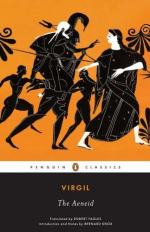|
|
The Aeneid Topic Tracking: Historical Subtext
Historical Subtext 1: This book is loaded with references to Roman history ancient and contemporary to its author. The hatred displayed between Rome and Carthage is a reflection of the long and brutal Punic wars that ravaged Rome and resulted in the ultimate destruction of Carthage. Jupiter foresees the Caesars who will end the republic and bring about a new golden age. By having this come from the mouth of Jupiter, Vergil makes the rule of Augustus Caesar a type of manifest destiny.
Historical Subtext 2: Vergil uses the prophecies to insert little details to Romanize the Trojans. Helenus' instructions to pray under a purple cloth is a reflection of a Roman custom. The Trojans become more and more like Vergil's contemporary Romans as they travel west.
Historical Subtext 3: Dido foretells the hatred between Carthage and Rome. In this way, Vergil incorporates Roman history into its foundation mythology, partially trying to justify the history of war between the two nations.
Historical Subtext 4: In his speech, Anchises points to most of the famous families of Rome and all the historical figures from the republic, the fall of the republic and the early empire. This speech focuses on the glories of the Caesars and the golden age they would usher in.
Historical Subtext 5: Although there are many things on his shield, the scene that stands out the most is that of the Battle at Actium. This is the battle where Augustus finally put an end to many years of civil war. For Vergil this was a contemporary scene for which he was pleased because it brought peace.
Historical Subtext 6: Juno's pleas with Jupiter to have the new people not named Trojans are a device meant to explain the contemporary state of Rome. They had no Trojan features of language or custom. This device absolves Vergil from having to explain their absence.




